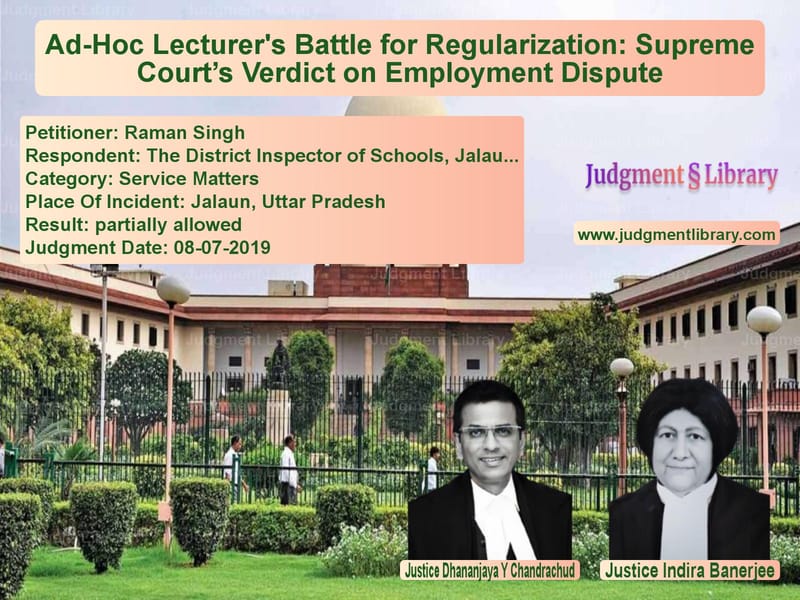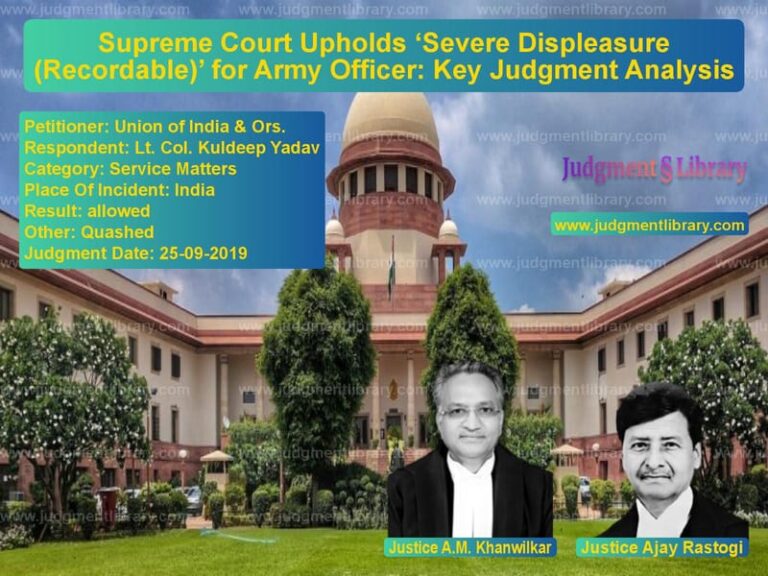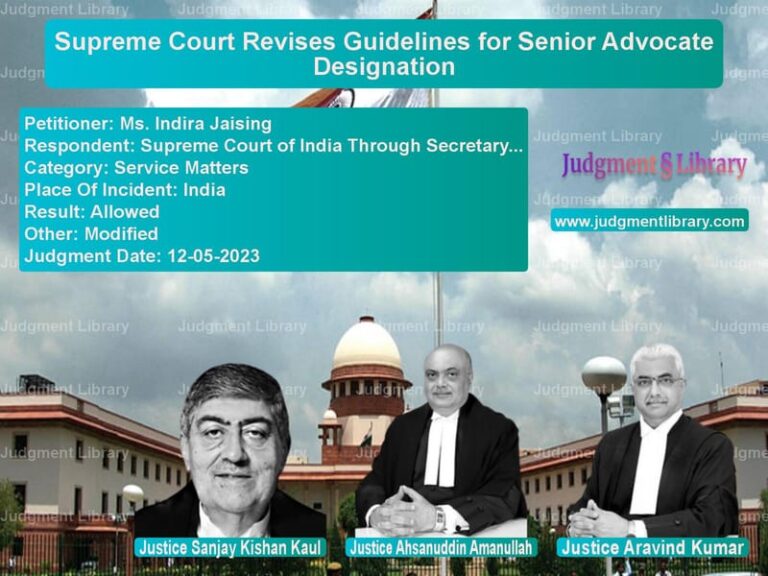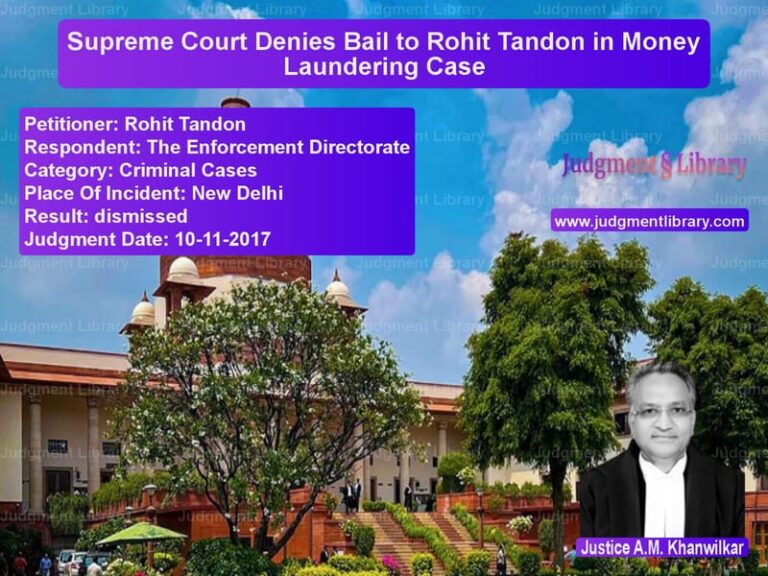Ad-Hoc Lecturer’s Battle for Regularization: Supreme Court’s Verdict on Employment Dispute
Employment disputes related to ad-hoc appointments in government-aided institutions often present complex legal challenges. In this case, the Supreme Court of India addressed a long-standing battle concerning the appointment and regularization of Raman Singh, who had been working as an ad-hoc Lecturer in English at a government-aided institution. The judgment, delivered by Dr. Dhananjaya Y Chandrachud and Indira Banerjee, clarified important principles regarding the rights of ad-hoc employees and the legal framework governing their absorption into substantive positions.
Background of the Case
The case originated when Raman Singh was appointed as a Lecturer in English on 11 August 1993. His appointment was intended to be temporary, as it was made against a short-term vacancy due to the leave granted to the regular incumbent. However, on 1 October 1993, the regular lecturer passed away, leading to a substantive vacancy. The management of the institution sought approval from the District Inspector of Schools (DIOS) to absorb Singh into the substantive position, but no response was received.
Despite the uncertainty surrounding his appointment, Singh continued working at the institution. In April 1996, he filed a writ petition in the High Court seeking a direction to treat his appointment as permanent and to release his salary, as the institution was government-aided. The High Court granted an interim order on 16 April 1996, allowing him to continue in the post until a regular appointment was made.
The Appointment of a Regular Candidate and Dispute
On 30 June 1997, Nem Singh was appointed as a Lecturer through the U.P. Secondary Education Service Selection Board. However, he never joined the post. According to the State, the appellant and the management colluded to prevent the selected candidate from taking charge. The Deputy Director of Education, in a letter dated 30 June 1997, confirmed that Nem Singh did not make any contact with the school. Consequently, Raman Singh continued to hold the post, though his salary was stopped.
Singh challenged this decision in the High Court, but his writ petition was dismissed on 9 October 2013. He then filed a Special Appeal before the Division Bench, which was also dismissed on 30 October 2017. The High Court ruled that since his appointment was in a leave vacancy under the Second Removal of Difficulties Order 1981 and lacked the required approval, he had no legal right to claim salary or permanent employment.
Supreme Court’s Consideration
Raman Singh challenged the High Court’s decision before the Supreme Court under Article 136 of the Constitution. During the proceedings, his counsel made a crucial statement:
“Learned counsel for the petitioner says that he does not claim any right over the post of lecturer in the school, but says that the petitioner may be allowed to continue till regular or other appointment is made.”
The Court noted that in the interim period, orders were passed directing the payment of salary for the period during which he worked. However, the fundamental issue remained whether Singh had any legal claim to be regularized in the substantive post.
Arguments by the Petitioner
Singh’s counsel, Ms. Meenakshi Arora, contended that the rejection of his appointment by the DIOS was unfair and procedurally flawed. She argued that:
- The rejection letter dated 14 July 1994 was not produced before the Single Judge of the High Court.
- The letter surfaced only during the Special Appeal before the Division Bench, indicating procedural irregularities.
- Since Singh had continuously served since 1993 under interim orders, he should be regularized as the senior-most teacher.
Arguments by the Respondents
On the other hand, the State’s counsel, Mr. Tanmaya Agarwal, argued that the appellant’s appointment was never valid under the U.P. Secondary Education Services Selection Board Act 1982. He cited the Full Bench decision in Pramila Mishra v. Deputy Director of Education (1997), which established that ad-hoc appointments do not grant a vested right to permanent employment.
The respondents further stated:
- Singh’s ad-hoc appointment could not be converted into a substantive one upon the death of the regular incumbent.
- No legal procedure was followed to make a regular appointment.
- Since 1997, a regularly selected candidate was available (Nem Singh), but the appellant and management prevented his joining.
Supreme Court’s Judgment
The Supreme Court ruled that Singh had no legal entitlement to claim regularization. Justice Chandrachud stated:
“The appellant had no right or entitlement to claim that his appointment on an ad-hoc basis in a leave vacancy should be converted into a substantive appointment.”
The Court emphasized that once a substantive vacancy arose, it had to be filled through proper legal procedures. The appellant’s continued service was only due to interim orders and could not form the basis for claiming a permanent position.
However, considering the circumstances and Singh’s long tenure, the Court made the following directions:
- The management must initiate steps to fill the substantive post within four months.
- Singh may continue on an ad-hoc basis until a regular appointment is made.
- Under Article 142, his salary must be paid for the period he works until a regular candidate is selected.
The Court also clarified that its order did not prevent the management from pursuing any pending representations for Singh’s appointment, but they must comply with legal procedures.
Conclusion
This case underscores the importance of following proper legal procedures in appointments within government-aided institutions. While interim court orders can allow continued service, they do not create a vested right to regularization. The Supreme Court balanced the need for legal compliance with fairness, ensuring that Singh continues to be paid while a permanent appointment is made. This judgment sets a significant precedent for similar employment disputes in the education sector.
Petitioner Name: Raman Singh.Respondent Name: The District Inspector of Schools, Jalaun at Orai & Ors..Judgment By: Justice Dhananjaya Y Chandrachud, Justice Indira Banerjee.Place Of Incident: Jalaun, Uttar Pradesh.Judgment Date: 08-07-2019.
Don’t miss out on the full details! Download the complete judgment in PDF format below and gain valuable insights instantly!
Download Judgment: Raman Singh vs The District Inspect Supreme Court of India Judgment Dated 08-07-2019.pdf
Direct Downlaod Judgment: Direct downlaod this Judgment
See all petitions in Employment Disputes
See all petitions in Termination Cases
See all petitions in Public Sector Employees
See all petitions in Judgment by Dhananjaya Y Chandrachud
See all petitions in Judgment by Indira Banerjee
See all petitions in partially allowed
See all petitions in supreme court of India judgments July 2019
See all petitions in 2019 judgments
See all posts in Service Matters Category
See all allowed petitions in Service Matters Category
See all Dismissed petitions in Service Matters Category
See all partially allowed petitions in Service Matters Category







